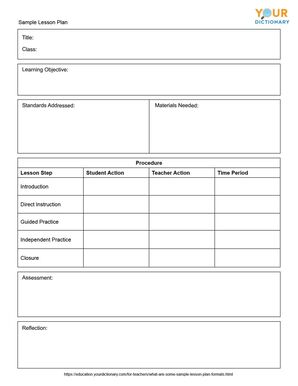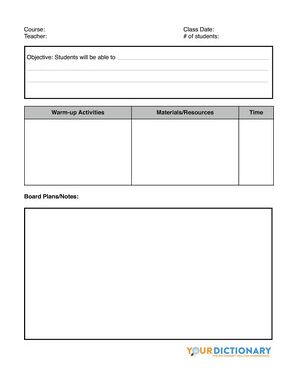

How do you write a lesson plan? Whether you are just enrolling in your first education course in college or stepping into the classroom as a teacher for the first time, looking for sample lesson plan formats is a smart way to get started. Take a look at the essential parts of a lesson plan and some sample lesson plan formats before starting your own.
Lesson Plan Format: Parts of a Lesson Plan
No matter how you format your lesson or your lesson plan, there are certain elements that you must include. Without them, your lesson won't come together successfully, and your students may not learn what you're teaching them. Check out the essential parts of a lesson plan before moving forward.
Lesson Plan Title and Context
Like all documents, a lesson plan requires a title. At the top of the page, list the grade level and subject that you are teaching. You might also want to include important contextual elements, such as where in a unit this lesson falls and the makeup of your class.
List of Materials
Creating a list of materials helps to keep you organized. Listing them out in your materials list, also called an Anticipatory Set, helps you visualize what you'll need during your lesson. Don't forget to list items such as whiteboard markers and a document projector, even if they're always present in your classroom.
Learning Objectives
Decide what skills or knowledge you want your students to obtain as a result of this lesson. These are measurable learning objectives, meaning that they include ways for students to demonstrate or show their learning. They typically begin with SWBAT (Students Will Be Able To ...) followed by an observable action. Learning objectives should be directly linked to the lesson assessment, which will tell you whether you succeeded in your objective or not.
Standards Addressed
Whether you use department standards, state standards or Common Core state standards, you need to connect your teaching to a standard of some kind. This will ensure that your students are on track with other classes in the school, district and state. Note that including only one or two standards is fine and very realistic since your assessment will likely only address one or two.
Lesson Procedure
Write down exactly what you will do in the lesson and how the students will engage in the activity. The procedure should be very clear with specific time allotments. Be realistic with what you can accomplish in the lesson, as adding too many activities for a time period can result in less successful learning.
Procedures are written in the following steps:
- Introduction - How do you begin class? (For example, warm-up activities, collecting homework, class discussion)
- Direct Instruction - How will you explicitly teach the concept or skill?
- Guided Practice - How will you allow students to begin practicing the concept or skill in a whole-class setting?
- Independent Practice - How will students work on this concept or skill independently (or with partners/groups)?
- Closure - How do you end class? (For example, a final discussion, turning in classwork, answering questions)
The idea is to go from a teacher-centered lesson into a student-centered lesson. Don't skip the introduction and closure; every student needs a minute or so to adjust to the beginning or end of class.
Learning Assessment
Every lesson should have at least a formative assessment at the end to check student learning. These assessments can be easy, informal activities that connect to the learning objectives. A strong lesson can include summative assessments as well.
Lesson Reflection
Reflecting on a lesson isn't just for teacher candidates! Every classroom teacher can benefit from a short reflection at the end of every lesson. What worked well in the lesson plan? What didn't work well? How can you address these issues going forward?
Sample Lesson Plan Templates
If you're ready to write your own lesson plan, download a printable sample lesson plan template designed to get you started. It's great for jotting notes in a lesson plan draft or creating a document perfect for your administrator or lead teacher.
Straightforward Lesson Plan
Whether you need a lesson plan for an observation, a substitute teacher or your own planning work, a straightforward one-page template will help you out. It includes all of the above elements of a lesson plan in an editable PDF format.

Template With Board Notes
If you're planning a lesson with a lot of board work, incorporating board notes is a smart idea. That way, you know exactly what to write on the board during each part of the procedure. Download a four-page lesson plan template with extra space to add board notes.

Lesson plan template
Click to View & DownloadOnce you've gotten your lesson plan down, be sure to have a personalized and logical rubric for your assessment activity. Include the rubric in both your lesson plan and your student assignments so everyone knows what your expectations are.
More Lesson Plan Examples
There many different ways in which you could approach a lesson plan. Depending on the subject matter, you can adjust the format of your lesson plan (as long as it includes the important elements of a lesson). Take a look at these lesson plans and use them as inspiration for your own lesson writing.
- A set of 3rd grade lesson plans for capitalization includes helpful worksheets and answer keys for easy assessment.
- Use fables to teach storytelling to 1st graders with an instructive language arts lesson plan.
- If you're teaching language arts, an adverb lesson for elementary can be a nice addition to your lesson planning process.
- These 1st grade math vocabulary lesson plans have several fun and interactive activities for young learners.
- Help young writers craft their stories with 7 creative writing lesson plan ideas.
- Use an engaging lesson plan to teach sight words to beginning readers.
In addition to showing you how to construct a lesson plan, these different sources also give you ideas for creative activities in the classroom. If none of these plans suit you, consider checking with an adviser or supervisor for additional sample lesson plan formats and ideas.
Learning to Teach Successfully
Learning how to teach is a long but valuable journey. Writing a high-quality lesson plan is an essential skill for any teacher, no matter where they are in their career. If you're still in need of a few pointers, try out these tips for writing lesson plans in any grade. Teachers who need to differentiate their plans for English learners can also check out these guidelines for building successful ESL lesson plans.